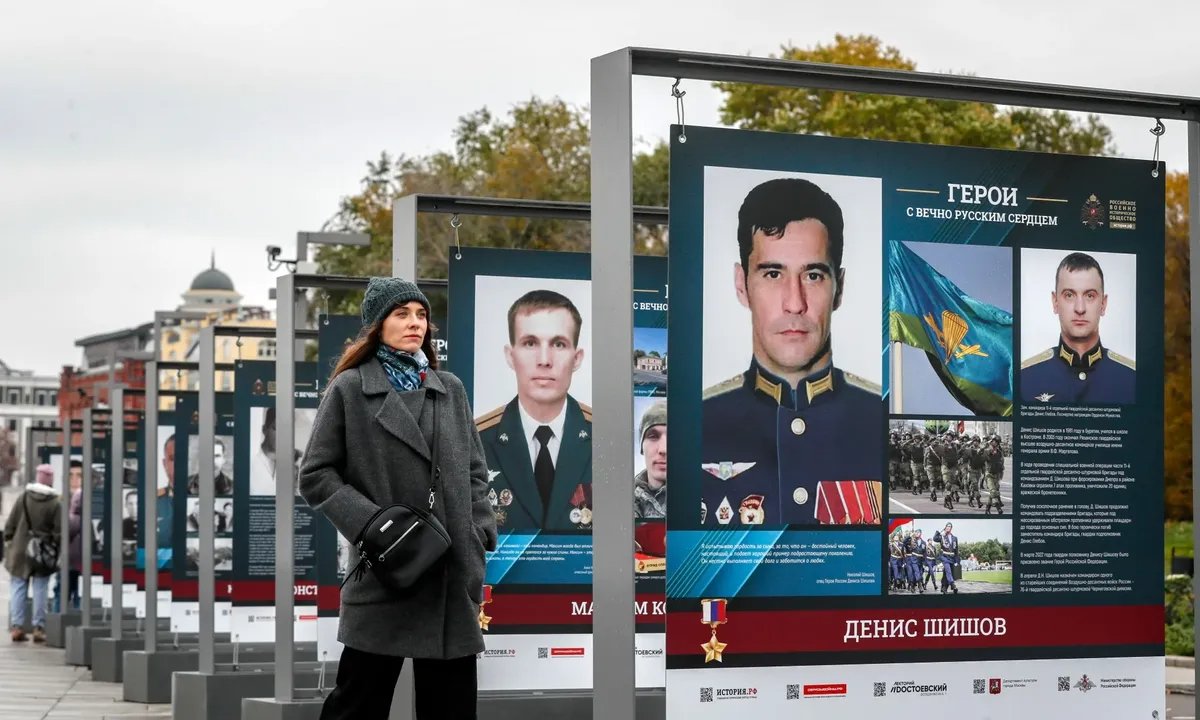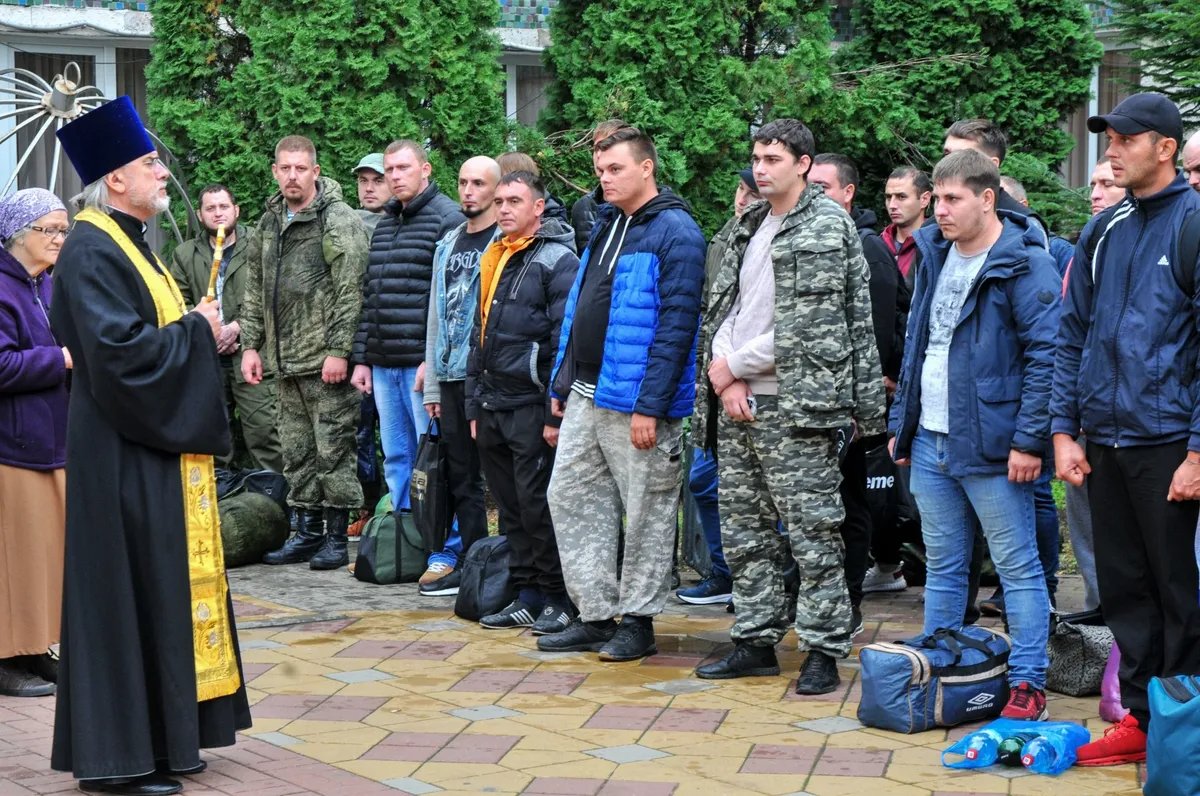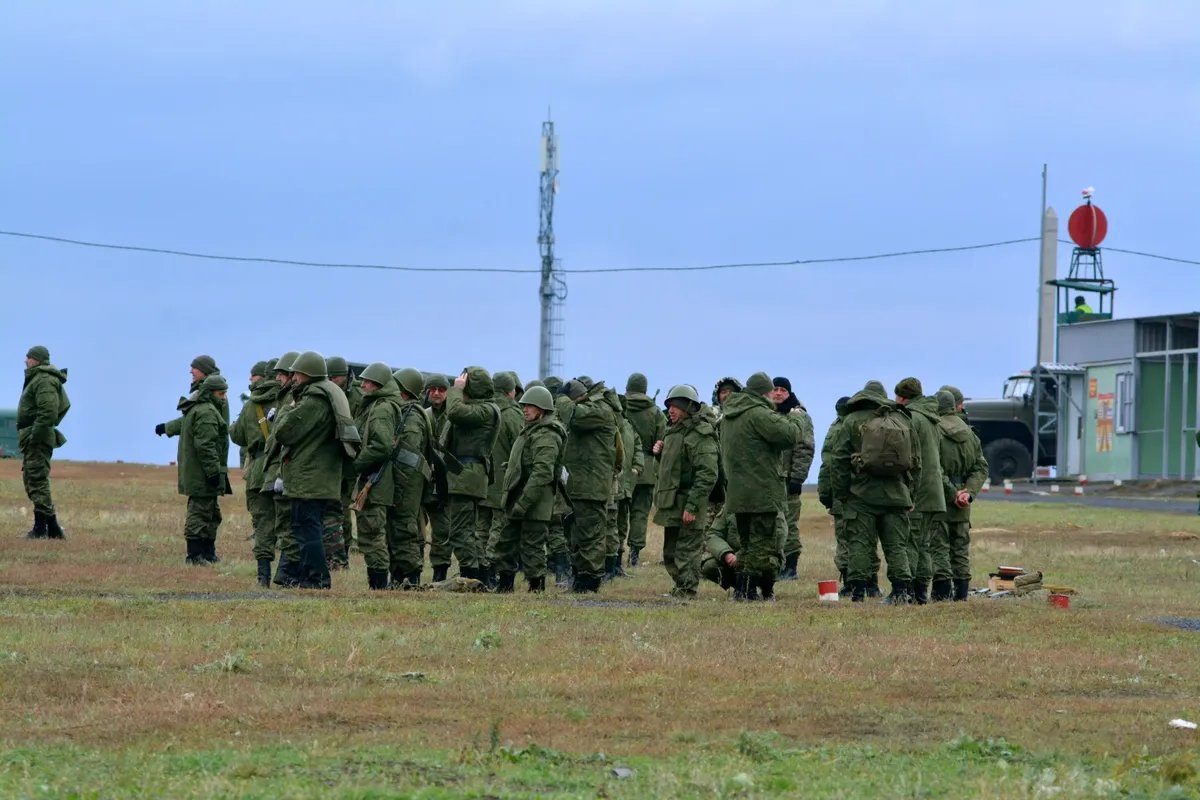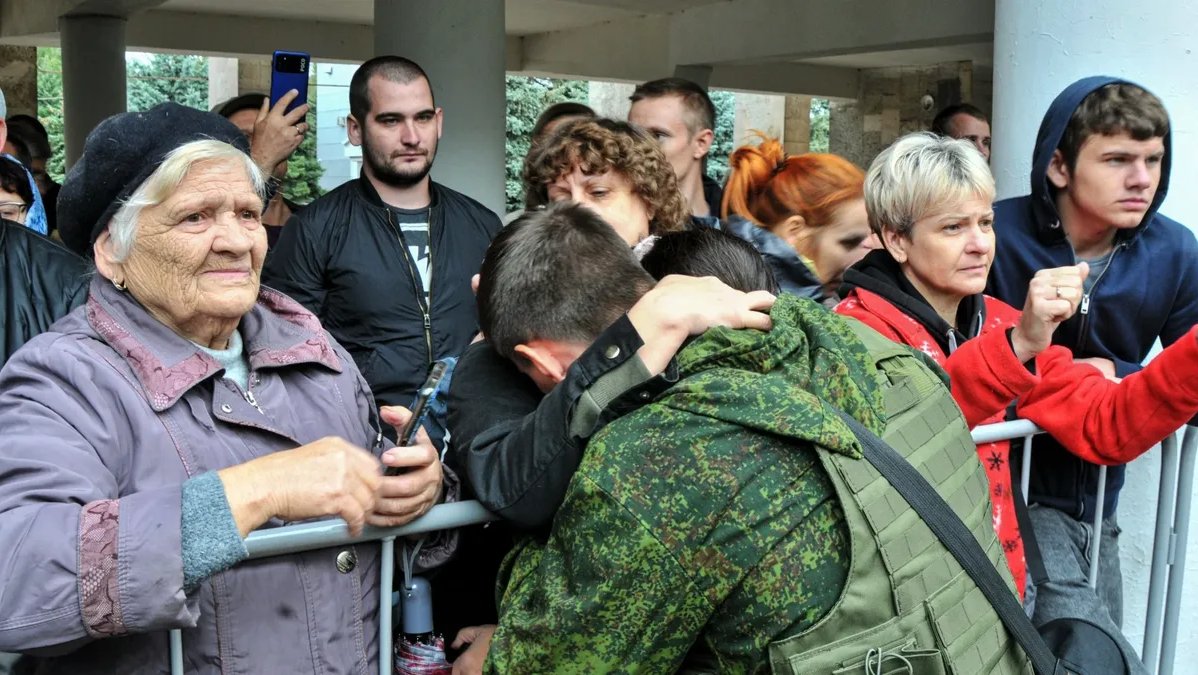The mobilised men from the Yampolsky regiment of the Kantemirovskaya division have been forced to stay in an abandoned house in Svatove, Ukraine’s Luhansk region, for almost a week without water and food. After they retreated from the front line, the command did not let them into the military base territory and threatened them with a court martial for refusing to return to the front line.
The group consists of 27 men, most of them are from the Moscow region. They were sent to the front line without any proper training, although they were promised during the draft that they would complete at least a two-week training course. In reality, the men who were mobilised in late September found themselves in a tent camp in the forests of Russia’s border-straddling Belgorod region on 1 October where they had no training other than digging trenches, and were sent to the battle zone in Svatove, Ukraine’s Luhansk region, with nothing but rifles. Their company was commanded by two men, also mobilised, who lacked combat experience. One of them was killed by shelling, the other was seriously wounded. The men could not get in touch with their relatives for two weeks. They contacted their wives on 26 October and asked for their help after General Vladimir Lugovoy had threatened them with a court martial for desertion, as they said.
Novaya Gazeta Europe spoke to the wives of three mobilised men from the Kantemirovskaya division about what is going on with their husbands right now.
On September 28, the wives and mothers of the mobilised men filed a complaint to the Moscow military prosecutor’s office of garrison No. 231 with a request to help their relatives. In the complaint, the women wrote that, on the orders of Major Nikolaev, the mobilised men from the 6th and 7th companies of the Yampolsky regiment of the Kantemirovskaya division were sent to the town of Svatove, Luhansk region, to the front line, where they suffered “strong mortar fire executed by Ukraine’s army”. Due to the death of their commanders and lack of radio connection with the HQ, the men decided to leave the front line and get back to the HQ. There, they say, the command started intimidating them and threatening them with a court martial should they not return to the front line. In their complaint, the women say that their husbands cannot return to the front line since they have no equipment and commanders to lead them. The women ask the prosecutor’s office to set up proper training for their men and provide them with decent equipment.
The following is the testimony of those women, with their names changed upon their request.

Photo: EPA-EFE / YURI KOCHETKOV
Irina, the wife of a 24-year-old mobilised man from Kantemirovskaya division’s 7th company
“My husband was mobilised on 25 September. He found a draft notice in his letter box. His opinion has always been the same: if he gets a draft notice, he won’t dodge the draft. We called the enlistment office, they said that my husband just needed to bring his passport and military ID for registration. He went there on 25 September and as he came back, he said: ‘In an hour we are leaving for the [military] unit.’
He was taken to a unit in Naro-Fominsk and sent to the Belgorod region on 28 September. He last called me on 14 October, told me he was off for the front line, and I then I was unaware what was happening to him. Other people told me he was alive and well. He then called me on 26 October and said: ‘Honey, help me, they’re going to declare us deserters. We’re going to face a court martial.’
They were under shelling in Svatove for 12 hours straight, every man in my husband’s company was a draftee. The men would lie on the ground in some forest up there; they couldn’t raise their heads because of the shelling. They faced artillery and mortars and saw a commander’s body torn apart. He was a draftee, too. Many suffered concussion, and many had their eardrums popped. Fortunately, my husband is alive and well. Their second commander had his rib fractured and suffered mortar wounds. He ordered them to retreat, so they retreated when it got dark. They took the wounded captain with them, obviously. When they arrived at the base, this is what they were told: ‘We’re not going to let you in, go back where you came from.’ They only allowed the wounded one in.
So, the lads are now in Svatove, the Luhansk region. They were left in the lurch. General Lugovoy visited them, threatening to send them to prison for desertion, five to seven years behind bars.
And they may be charged with failing to obey their commander’s order for leaving the front line, too. The thing is that they lack supplies, help, and training. My husband had no training at all. There are 27 men out there, and they refuse to get back to the front line because they don’t want to die. After they had refused, they were offered new equipment: body armour, helmets. Otherwise, they were to face a court martial. So, they said: ‘We’re not going back.’ Now they’re staying in some abandoned house there. They had their bank cards blocked, they have no money, no food, and no water. My husband told me he hadn’t eaten for several days, and we don’t know what to do. We went to the military prosecutor’s office, our complaint was accepted, but all they said to us was ‘wait’. They said the war was on and that nobody knew how things would work out because the last time a mobilisation was declared was 80 years ago.”
Yekaterina, the wife of a 27-year-old mobilised man from Podolsk
“My husband was mobilised on 27 September, he was sent from Podolsk to a military unit in Naro-Fominsk, the Kantemirovskaya division. He was told that he would spend two weeks at the unit and would undergo a medical commission. However, he spent less than a day there and was taken by train to the Belgorod region, to a forest near Valuyki. They would dig trenches during the first couple of days and camp out in the open air. I got to see that camp because I visited the place. It was a tent camp, and inside the tents there were potbelly stoves with holes in them, my husband says. Some of the men would sleep in the open air since they had no tents. Me and relatives of other mobilised men arrived at that camp on 9 October, it was very dangerous out there, there was shelling every day. So, when we arrived and got out of the car, the lads met us and said: ‘If you hear somebody screaming ‘Incoming!’, get down on the ground immediately.’ They got used to this command since they were under constant shelling. It was really, really scary. When we left the place, my husband gave me a call and said: ‘Thank God you left, we got some shelling here.’
He and the rest of his company were sent to the front line on 14 October. Another group that left on 7 October suffered shelling, too. My husband says there were 96 men there, and only 20 of them survived.
The same thing happened two weeks later, our husbands suffered shelling, too. They would lie on the ground for hours long, pretending to be dead for a simple reason: they had no other weapons except some assault rifles. Against them were mortars and drones, and if they had moved a finger, a drone would kill them right away. Their wounded commander has not received any aid yet, they say they have no equipment. When we had COVID, all gyms and children’s hospitals were turned into COVID centres nationwide. So, here’s a question to our state: where are the medical centres for the mobilised? I have so much indignation inside me, but it is Russia, so I’ll probably have to accept it, I know.

Photo: EPA-EFE / ARKADY BUDNITSKY
Our husbands were leaving the enlistment offices in good spirits, with smiles on their faces and hope for the victory. They said: ‘Our homeland has drafted us, so we need to obey.’
Unfortunately, what we hear from them today is quite the opposite: they say their homeland doesn’t help them at all, they say that their commanders consider them cannon fodder.
The authorities have mobilised keyboard warriors with no military experience and sent them to slaughter. When my husband was leaving, he said he would die for Russia if needed, said he would never reject his homeland. His world view is totally different now. This is what he told me recently: ‘I’m ready to desert the army, I’d rather go to prison than the front line. The latter is a one-way ticket.” They haven’t eaten for two days, and then they somehow found some cash and bought a bit of food.
We raise a child together. We are a good, kind family. My husband works as a traffic superintendent in a company, he’s in charge of logistics up there. He is a tender, lovesome man, and a kind one, too. The most important thing is that he used to be the breadwinner, and now some military boss threatens him with a court martial for desertion for no reason at all.”
Support independent journalism
Yelena, the wife of a 31-year-old mobilised man from Naro-Fominsk
“I’ve been trying to remain silent, afraid to harm my husband, but he called me on 26 October and asked for help.
When he was just drafted, he thought he would stay with the military unit in Naro-Fominsk for a month, but in fact he stayed with the unit for two days only, and after three days, they were taken to Valuyki, in the Belgorod region. They built a campsite in a forest. They had no training out there, they were only taken to a shooting range twice, and that’s it.
The group was taken to Svatove near the front line on 14 October. I hadn’t heard from him for two weeks. I’d been visiting all sorts of departments and called the regimental duty officer every now and then to learn my husband’s whereabouts. They only told me there was neither cargo 200 [killed] nor 300 [wounded]. So, this settled my nerves for some period.
And then my husband called me on 27 October, said it was total chaos out there, told me they were being used as a living shield with nothing but assault rifles. Lacking any equipment, they were sent there escorted by two guys, also draftees, who had zero combat experience. This is what he said to me: ‘Lena, we’ve spent half a day on the ground because we had mortar fire and drones against us.’ All that happened in a forest belt, where there is neither foliage nor shelters, he said.
On 24 or 25 October, they came under mortar fire while trying to get out, and one of their commanders had his body torn to pieces. My husband helped the second one, took him to the base and returned to lead the other guys out. When they arrived at the base, they were told to get back where they came from.

Photo: Arkady Budnitsky / Anadolu Agency via Getty Images
Now they’re in some abandoned house in Svatove. I think it’s totally off limits to send the guys there with no cover and no equipment like a living shield. How are they supposed to help Russia this way? I don’t have a spare husband. The servicemen got to choose this profession, it is their job, but my husband is a civilian. We never went into hiding or tried to dodge the draft. The lads are still not hiding from anyone, but they’re threatened with desertion charges. They are no deserters; they did not run away. What they did was taking the wounded out of the battle zone, putting their lives at stake. So, some receive medals for such deeds, and some face desertion charges?
A few days later, we somehow managed to transfer some money to them, they found some person and we sent the money with interest to his bank card, and he gave it to them in cash so that they could buy some food and water. They lost all their belongings after a mortar shelling, they only have one sleeping roll, and it’s so cold now.
The guys demand that the prosecutor’s office investigate why they weren’t properly trained, they demand to change the commanding staff, return everyone to Russia for a month’s time so that they can be trained in shooting and tactics.
My husband is a patriot, he firmly believed in our Russian army, in our government. He never dodged the draft, and went to defend our homeland with his head up high, and everything was going great before our homeland betrayed him and threw him under shellfire like cannon fodder with nothing to fight with. He says that he got disappointed in our state, in our army, although he had fiery eyes as he was leaving, and said: ‘If I survive and everything is in order, I will continue to serve in the army.’ Now they have broken his psyche completely, and he refutes everything he had said before.
The guys would rather go to prison than return to the front line. I ask him about his stance every day now, thinking that he might change his opinion. But no, this is his clear stance now: “I’d rather go to prison than defend my state like this, the state that doesn’t care about people’s lives.”
Join us in rebuilding Novaya Gazeta Europe
The Russian government has banned independent media. We were forced to leave our country in order to keep doing our job, telling our readers about what is going on Russia, Ukraine and Europe.
We will continue fighting against warfare and dictatorship. We believe that freedom of speech is the most efficient antidote against tyranny. Support us financially to help us fight for peace and freedom.
By clicking the Support button, you agree to the processing of your personal data.
To cancel a regular donation, please write to [email protected]

